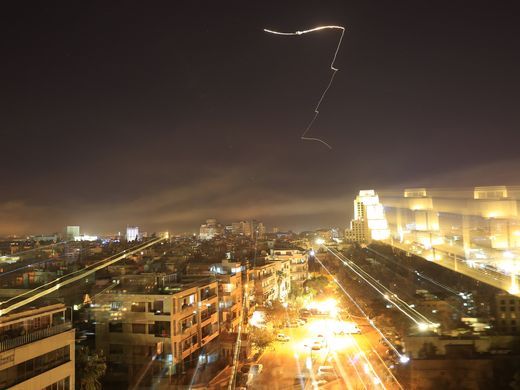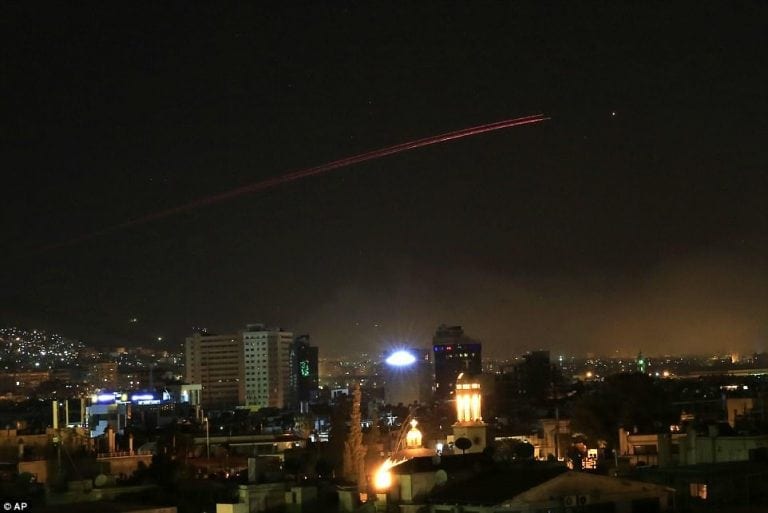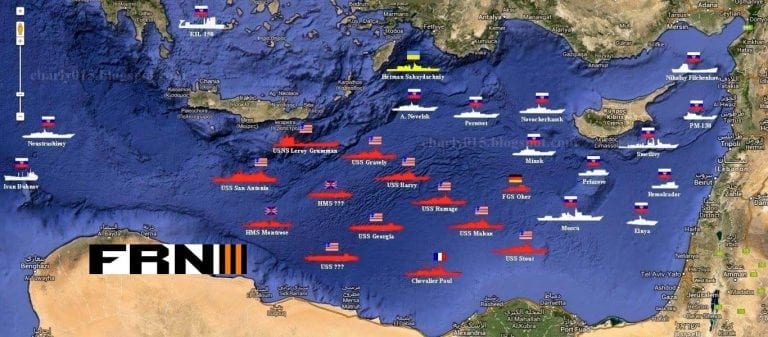But is there something else going on beneath the surface?

Damascus skies erupt with anti-aircraft fire and smoke as the U.S. launches an attack on Syria targeting different parts of the Syrian capital Damascus, early Saturday, April 14, 2018. Damascus has been rocked by loud explosions that lit up the sky with heavy smoke as U.S. President Donald Trump announced airstrikes in retaliation for the country’s alleged use of chemical weapons. (AP Photo/Hassan Ammar)
The Syrian Arab Army has stunned the world with its successful defense of Damascus, assets, and military installations in the early hours of April 14th, 2018. The attacks by the US and UK consisted of over a hundred missiles, were carried out without UN Security Council approval and are illegal in international law. This confirms once again the status of the two Atlanticist regimes as criminal offenders of the highest order. The failure of the US attack may have any number of explanations, ranging from ineptitude, inability to project, a well maintained and upgraded Syrian army, or even a lack of American resolve.
Of course in war, the ‘coordinated attack’ is so basic that it goes without being explained. But the Trump administration attacks on Syria appear coordinated in a very different way. Were the attacks coordinated with the Russians?
There would be a pattern of coordination with these attacks, if this attack was also coordinated. These are becoming standard ‘response’ type attacks, we had the feckless US attack on the Syrian air base a year ago, the Shayrat missile strike on April 7th, 2017, where nothing really hit. At the time, we suggested and were not alone to suggest, that something was off with the Shayrat attack as well.
It appeared the US had communicated the target specs to the Russians who relayed them to the Syrians. It became a matter of the historical record that the US did in fact consult the Russians on target locations in order to minimize the risk of hitting Russian personnel, etc. Damage was close to nil, six planes damaged and with a single pock-mark in the run-way being fixed within an hour or so. Casualties listed at about 9 dead, and while there’s no particular reason to doubt this number, crazier things have been claimed in the past.
The Russians at the time considered that the “combat effectiveness” of the April 2017 attack was “extremely low”. Of 59 launched, only 23 missiles hit the base destroying six aircraft, and the other 36 could not be accounted for. At the time, experts wondered whether the US had used this opportunity to use expired Tomahawk missiles, or even whether the US was pulling its punches.
In a similar attack last night that was announced similarly by the sitting US president, we have last night’s laser light and fireworks show.
Now looking again at how this has gone down, in the early hours of April 14th, 2018, we have the US firing – according to what the Russian General Staff issued in a statement – a total of 103 cruise missiles from which 71 had been intercepted by Syria, adding that no government military airfield had been damaged as a result of the attack.
Setting ‘rates’ aside, what really matters is what was hit. If the tactic was to overwhelm the defense systems than a high intercept rate would be expected as a possibility. If the airfields were the strategically significant target of the attack, then it certainly was a failure.
Is the US simply not capable of more than this? Was it pulling its punches? Was this chiefly a cathartic attack which can now bring to rest an openly exposed to story that the Brits are failing embarrassingly and repeatedly in their staged attacks at home and in Syria?
In terms of capacity, we showed a map with the positions of US and Russian naval ships in the eastern Mediterranean,
Regional naval assets of chief (semi)-belligerent powers
So in terms of capacity, it would appear that in the event of an escalated attack that would draw Russia in – something which apparently the US wanted to avoid –there is a counterbalance of Russian naval force in the region and in between the land-mass and the Atlanticist naval forces. There is a decent argument from this alone, that the US simply lacks the capacity to project from their location and hit the targets. Then why carry it out?
And at the same time, today’s attack may satiate some of the forces within the Atlanticst power structure, and serve a cathartic purpose. Now moderates can tell hawks, ‘there you’ve got your attack’. Now what the media has been on about, and what the majority congressional pro-war caucus of sorts has been demanding, can be put to rest for a moment. The divisions in American society, however, are deeper than this. We saw a similar situation with the attack a year ago. There was an alleged chemical attack in Syria, which invariably involved the foreign intelligence and operations wing of the government – like the CIA – and then there was media and congressional pressure on Trump (that time they spoke of impeachment), and then we had his ordered attack on the Syrian air base.
And just as with a year ago, we saw some wing of the US power establishment working through the CIA to create these false flag attacks, that are also part hoaxed or use hoaxed evidence, which force the US president to order some attack. And now, as then, these attacks ended up not being very impressive.
[dropcap]I[/dropcap]n the backdrop of all of this is a president who publicly opposes escalation from day one and has moved to declare the conflict over, indicating a redeployment of forces to the US-Mexico border, and in so doing, returning national discourse to domestic issues. And then, and now, has been some success at directing American public attention away from domestic matters for a moment and back to the Syria question, and foreign terrorism by extension.What’s additionally interesting now, is that just as with the April 2017 attack, Russia makes an official announcement involving the use or sale of its S-300 or S-400 defense system. In statements recorded by Tass, the spokesman of the General Staff continued:
“A few years ago, we refused to supply S-300 air defense systems to Syria due to the request of some of our Western partners. (sic) Taking into account what happened, we consider it possible to return to this issue. And not only with regard to Syria, but with regard to other states”.
In their statement, they included that Syrian air defense forces had successfully intercepted all twelve of the cruise missiles which had been used to attack the Dumayr military airfield, the base is used to support the army campaign on Eastern Ghouta.
We find an important narrative here that Russian air defenses were not used to repel the missile strike, being said both in passing reference to the Syrian army’s work, and with a direct statement. The subsequent framing by Russian media is not simply stenography, but in fact narrative construction.
“Russia’s air defenses haven’t been used to repel the missile strike on the territory of the Syrian Arab Republic”, the military said. This is very clear, and mirrors de-escalation discourse. The US appears to have decided not to directly engage with Russian targets.
“None of the cruise missiles launched by the US and its allies entered the zone of responsibility of the Russian air defenses, covering objects in Tartus [naval facility] and Hmeymim [airbase located in Latakia province],” the Russian Defense Ministry added. And is this not convenient?
“Russian air defense systems at the Hmeymim and Tartus bases have timely found and controlled all the missile launches from naval and air vehicles of the US and Britain,” the Russian General Staff stated to Tass. They added that they hadn’t recorded French aviation’s participation in the attack, which is also interesting to note for several reasons, beyond any truth value it may have.
The obvious message is the important message here – Russia and the US did not engage, so do not expect a Russian ‘retaliation’ militarily. The Syrian Arab Army will continue its clean-up campaign and Russia will pursue diplomacy on multiple fronts and in multiple vectors.
This doesn’t rule out that Russia won’t escalate in other ideas, as a ‘cold’ response. That is a long established Russian method, which reflect sovereign prerogative.
Again this goes in hand with the idea that there are serious divisions within the US power structure over how to manage Syria, in fact on any number of questions substantively, all together.
Russia has just announced that it had evidence that Atlanticists, in particular in the UK government, had fabricated parts of its evidence of the alleged Syrian chemical attack.
While the Syrian Arab Army no doubt performed optimally, the history of US and Russian coordination which limited the scope of the attacks in more ways than one, and the similar circumstances surrounding this attack, lead us to lend credence to the possibility that this attack too reflected some degree of coordination and limitation.
Overall, the idea that ineffective US attacks reflect some divisions in the US power establishment, isn’t far fetched. At the same time, more standard explanations should first be given weight. It has been written about for some time, that US power projection is dwindling. These are matters of relative development – country’s defense capacities have increased in the last few decades, and the problems with the US’s predominant military doctrines have been exposed.
The questions that remain open are – to what extent will today’s attacks satiate elements of the US elite and open up the possibility for diplomacy?
What is the general consensus on the cost/benefit to winning the Syrian conflict from the point of view of American elites?
Will successive direct US attacks on Syria also follow this pattern of low success? What are the real reasons for this?
Addendum Bashar Assad noted the superiority of Russian weapons over the Western, said member of the State Duma Committee on International Affairs, Sergei Zheleznyak. “Assad spoke very positively about Russian weapons,” the deputy said after talking with a group of Russian parliamentarians with the Syrian president. At the same time, Zheleznyak said that they did not discuss the supply of Russian air defense systems with the Syrian leader. Earlier, the Defense Ministry said that Russia could return to consideration of the issue of deliveries of the S-300 SAM to Damascus. Meanwhile, Assad criticized American armament. “Yesterday we saw American aggression, and we repulsed it with rockets of 1970’s release … Since the 1990’s, American films have shown that Russian weapons are backward, and today we see who really lags behind,” the Syrian leader said. His words were passed by another member of the delegation – the chairman of the patriotic platform of “United Russia” Dmitry Sablin. On Wednesday, an official delegation of Russian parliamentarians arrived in Syria on an official visit. During the attack on Damascus, none of them suffered. On Saturday night, the United States, Britain and France fired more than 100 missiles at civilian and military sites in Syria, injuring three people. Most of them Syrian air defense managed to bring down. At the same time, there is no evidence of Damascus using prohibited substances. The attack occurred prior to the OPCW investigation. Experts of the Russian Center for the Reconciliation of Warring Parties (CPAP) last week visited the site of the alleged incident and found no traces of toxins. In Moscow, the actions of Western countries were called “an impudent violation of international law”.
Failed US Attack: Assad Impressed With 1970’s Soviet Weapons
translated by J. Flores from Rusvesna

This work is licensed under a Creative Commons Attribution-NonCommercial 4.0 International License
While our media prostitutes, many Hollywood celebs, and politicians and opinion shapers make so much noise about the still to be demonstrated damage done by the Russkies to our nonexistent democracy, this is what the sanctimonious US government has done overseas just since the close of World War 2. And this is what we know about. Many other misdeeds are yet to be revealed or documented.
Parting shot—a word from the editors
The Best Definition of Donald Trump We Have Found
 In his zeal to prove to his antagonists in the War Party that he is as bloodthirsty as their champion, Hillary Clinton, and more manly than Barack Obama, Trump seems to have gone “play-crazy” — acting like an unpredictable maniac in order to terrorize the Russians into forcing some kind of dramatic concessions from their Syrian allies, or risk Armageddon.However, the “play-crazy” gambit can only work when the leader is, in real life, a disciplined and intelligent actor, who knows precisely what actual boundaries must not be crossed. That ain’t Donald Trump — a pitifully shallow and ill-disciplined man, emotionally handicapped by obscene privilege and cognitively crippled by white American chauvinism. By pushing Trump into a corner and demanding that he display his most bellicose self, or be ceaselessly mocked as a “puppet” and minion of Russia, a lesser power, the War Party and its media and clandestine services have created a perfect storm of mayhem that may consume us all.— Glen Ford, Editor in Chief, Black Agenda Report
In his zeal to prove to his antagonists in the War Party that he is as bloodthirsty as their champion, Hillary Clinton, and more manly than Barack Obama, Trump seems to have gone “play-crazy” — acting like an unpredictable maniac in order to terrorize the Russians into forcing some kind of dramatic concessions from their Syrian allies, or risk Armageddon.However, the “play-crazy” gambit can only work when the leader is, in real life, a disciplined and intelligent actor, who knows precisely what actual boundaries must not be crossed. That ain’t Donald Trump — a pitifully shallow and ill-disciplined man, emotionally handicapped by obscene privilege and cognitively crippled by white American chauvinism. By pushing Trump into a corner and demanding that he display his most bellicose self, or be ceaselessly mocked as a “puppet” and minion of Russia, a lesser power, the War Party and its media and clandestine services have created a perfect storm of mayhem that may consume us all.— Glen Ford, Editor in Chief, Black Agenda Report









